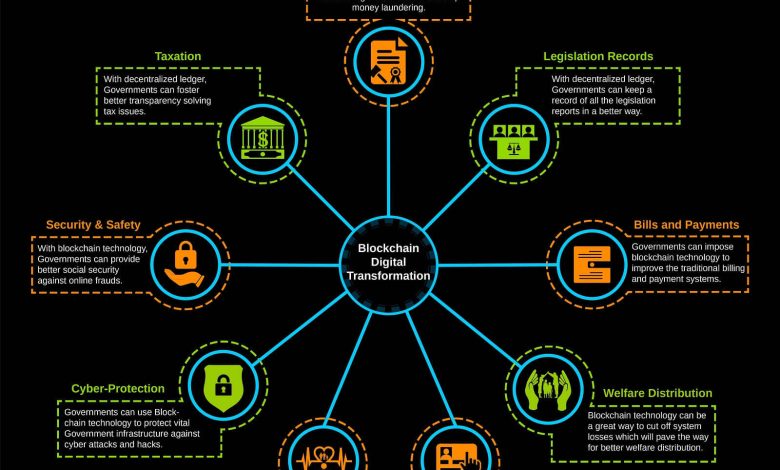How Blockchain Is Being Used in Government Services

- Introduction to Blockchain Technology
- Benefits of Implementing Blockchain in Government Services
- Examples of Blockchain Applications in Government
- Challenges and Concerns of Using Blockchain in Government
- Future Outlook for Blockchain in Government Services
- Case Studies of Successful Blockchain Implementation in Government
Introduction to Blockchain Technology
Blockchain technology is a revolutionary innovation that has the potential to transform the way government services are delivered. **Blockchain** is a decentralized, distributed ledger that securely records transactions across a network of computers. This technology ensures transparency, security, and immutability of data, making it an ideal solution for government agencies looking to streamline processes and enhance trust with citizens.
One of the key benefits of **blockchain** technology in government services is its ability to reduce fraud and corruption. By creating a tamper-proof record of transactions, **blockchain** can help prevent unauthorized alterations to data, ensuring the integrity of government operations. Additionally, **blockchain** can improve the efficiency of service delivery by automating processes and reducing the need for intermediaries.
Another advantage of **blockchain** technology in government services is its potential to increase transparency and accountability. By providing a transparent and auditable record of transactions, **blockchain** can help build trust between government agencies and citizens. This increased transparency can also help reduce the risk of data breaches and cyber attacks, as **blockchain** technology is inherently secure.
Overall, **blockchain** technology has the potential to revolutionize the way government services are delivered, making processes more efficient, transparent, and secure. As more government agencies adopt **blockchain** technology, we can expect to see significant improvements in service delivery and citizen trust.
Benefits of Implementing Blockchain in Government Services
Implementing blockchain in government services offers a wide range of benefits that can revolutionize the way public sector organizations operate. Some of the key advantages include:
- Increased transparency: Blockchain technology provides a secure and transparent way to record transactions, making it easier for citizens to track how their data is being used by the government.
- Enhanced security: The decentralized nature of blockchain makes it extremely difficult for hackers to manipulate data, reducing the risk of fraud and cyber attacks.
- Improved efficiency: By automating processes and reducing the need for intermediaries, blockchain can streamline government services and save time and money.
- Better accountability: The immutability of blockchain ensures that once data is recorded, it cannot be altered or deleted, holding government officials accountable for their actions.
- Empowered citizens: With blockchain, citizens have more control over their personal information and can interact with government services in a more secure and efficient manner.
Overall, the implementation of blockchain in government services has the potential to transform the public sector by promoting trust, security, and efficiency in the delivery of services to citizens.
Examples of Blockchain Applications in Government
Blockchain technology has been increasingly adopted by governments around the world to improve transparency, security, and efficiency in various services. Here are some examples of how blockchain is being used in government:
- **Voting Systems**: Some governments are exploring the use of blockchain for secure and transparent voting systems. By recording votes on a blockchain, the integrity of the voting process can be ensured, reducing the risk of fraud and manipulation.
- **Identity Management**: Blockchain can be used to create secure digital identities for citizens. This can help streamline processes such as applying for government services, accessing healthcare, or voting, while also protecting personal data.
- **Supply Chain Management**: Governments can use blockchain to track and verify the authenticity of goods and services in the supply chain. This can help prevent counterfeiting, ensure product safety, and improve overall efficiency.
- **Property Records**: Blockchain technology can be used to securely store property records, making it easier to verify ownership, transfer property rights, and reduce the risk of fraud in real estate transactions.
- **Smart Contracts**: Governments can use blockchain-based smart contracts to automate and enforce agreements in a transparent and secure manner. This can streamline processes such as procurement, licensing, and regulatory compliance.
Overall, blockchain technology has the potential to revolutionize government services by increasing trust, reducing costs, and improving the overall quality of services provided to citizens.
Challenges and Concerns of Using Blockchain in Government
There are several challenges and concerns associated with the implementation of blockchain technology in government services. One of the main concerns is the issue of scalability. As the amount of data stored on the blockchain grows, it can become increasingly difficult to process transactions quickly and efficiently. This could potentially lead to delays in the delivery of government services, which could have a negative impact on citizens.
Another challenge is the issue of security. While blockchain technology is known for its security features, it is not immune to cyber attacks. If a government agency’s blockchain network were to be compromised, it could result in the loss of sensitive data and undermine public trust in the system.
Additionally, there are concerns about the regulatory environment surrounding blockchain technology. Governments may struggle to keep up with the rapid pace of technological change, leading to outdated or conflicting regulations that could hinder the adoption of blockchain in government services.
Moreover, there are concerns about the cost of implementing blockchain technology in government services. Building and maintaining a blockchain network can be expensive, and governments may struggle to justify the cost in the face of competing budget priorities.
Overall, while blockchain technology has the potential to revolutionize government services, there are several challenges and concerns that need to be addressed in order to realize its full potential.
Future Outlook for Blockchain in Government Services
The future outlook for blockchain in government services is promising, with the technology offering numerous benefits for enhancing transparency, security, and efficiency in various processes. As more government agencies and departments explore the potential of blockchain, we can expect to see a significant transformation in how services are delivered to citizens.
One of the key advantages of blockchain in government services is its ability to create immutable and transparent records of transactions, contracts, and other important data. This can help reduce fraud and corruption, as well as streamline processes by eliminating the need for intermediaries. Additionally, blockchain can enhance data security by encrypting information and providing a decentralized system that is resistant to tampering.
Another area where blockchain can make a significant impact is in identity management. By using blockchain technology, governments can create secure digital identities for citizens, which can be used for accessing various services online. This can help reduce identity theft and improve the overall user experience for citizens interacting with government agencies.
Furthermore, blockchain has the potential to revolutionize voting systems by providing a secure and transparent platform for conducting elections. By using blockchain technology, governments can ensure the integrity of the voting process and increase voter trust in the outcome. This can help address concerns about election fraud and manipulation, ultimately leading to more democratic and fair elections.
Overall, the future of blockchain in government services looks bright, with the technology poised to bring about significant improvements in transparency, security, and efficiency. As more governments adopt blockchain solutions, we can expect to see a more streamlined and trustworthy delivery of services to citizens. It is essential for government agencies to continue exploring the potential of blockchain and to invest in the necessary infrastructure to fully leverage the benefits of this transformative technology.
Case Studies of Successful Blockchain Implementation in Government
Several governments around the world have successfully implemented blockchain technology in various services to improve efficiency, transparency, and security. Here are some case studies of successful blockchain implementation in government:
- **Estonia:** The Estonian government has been a pioneer in using blockchain for its e-residency program. This initiative allows individuals from anywhere in the world to become digital residents of Estonia, enabling them to start and manage businesses online. Blockchain technology ensures the security and integrity of personal data, making the process efficient and trustworthy.
- **Singapore:** Singapore has implemented blockchain in its public sector to streamline bureaucratic processes and enhance data security. By using blockchain for record-keeping and identity verification, the government has been able to reduce administrative costs and prevent fraud. This has led to increased trust in government services among citizens.
- **Dubai:** The government of Dubai has integrated blockchain into various sectors, including real estate, healthcare, and transportation. By digitizing government services and storing data on a decentralized ledger, Dubai has improved the speed and accuracy of transactions while ensuring data privacy. This has resulted in a more efficient and responsive government.
These case studies demonstrate the diverse applications of blockchain technology in government services, showcasing its potential to revolutionize the public sector. By leveraging blockchain, governments can enhance service delivery, increase transparency, and build trust with citizens. As more governments adopt blockchain solutions, we can expect to see further innovation and improvement in the way public services are delivered.






